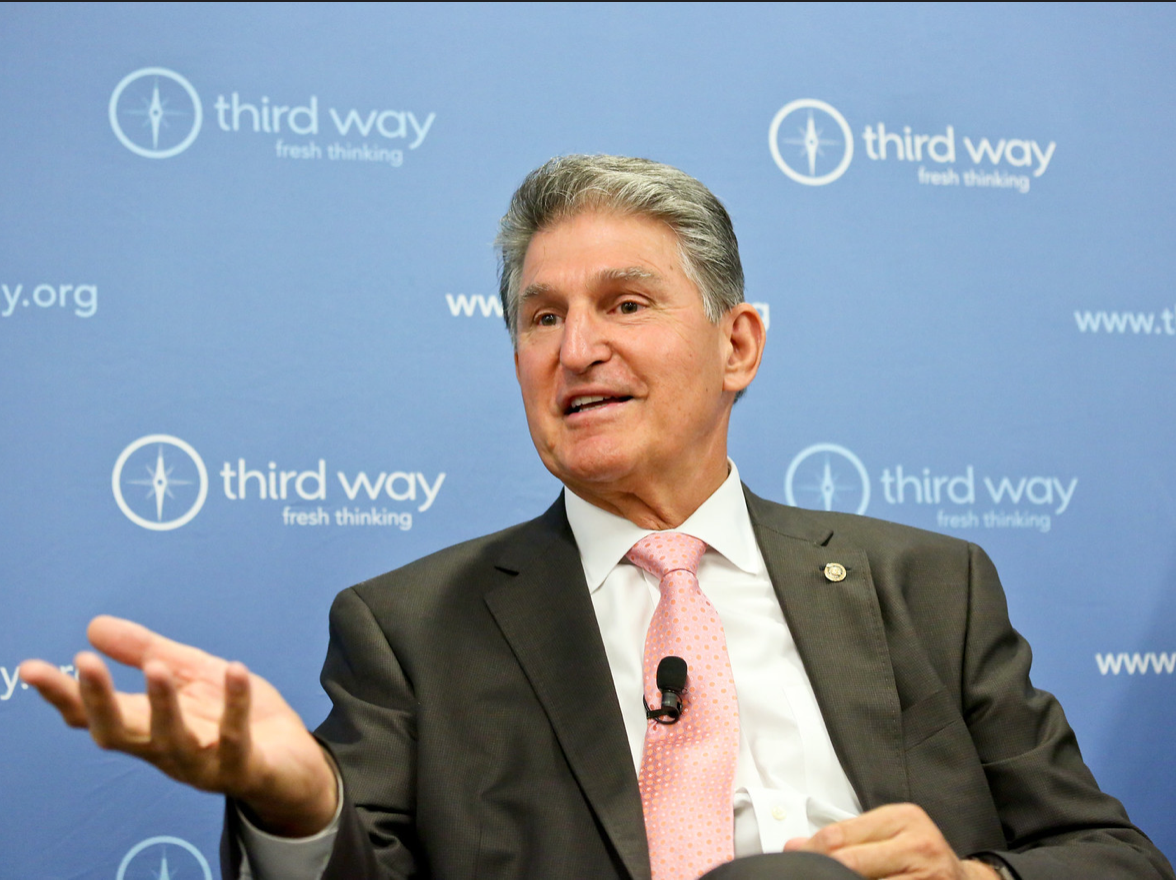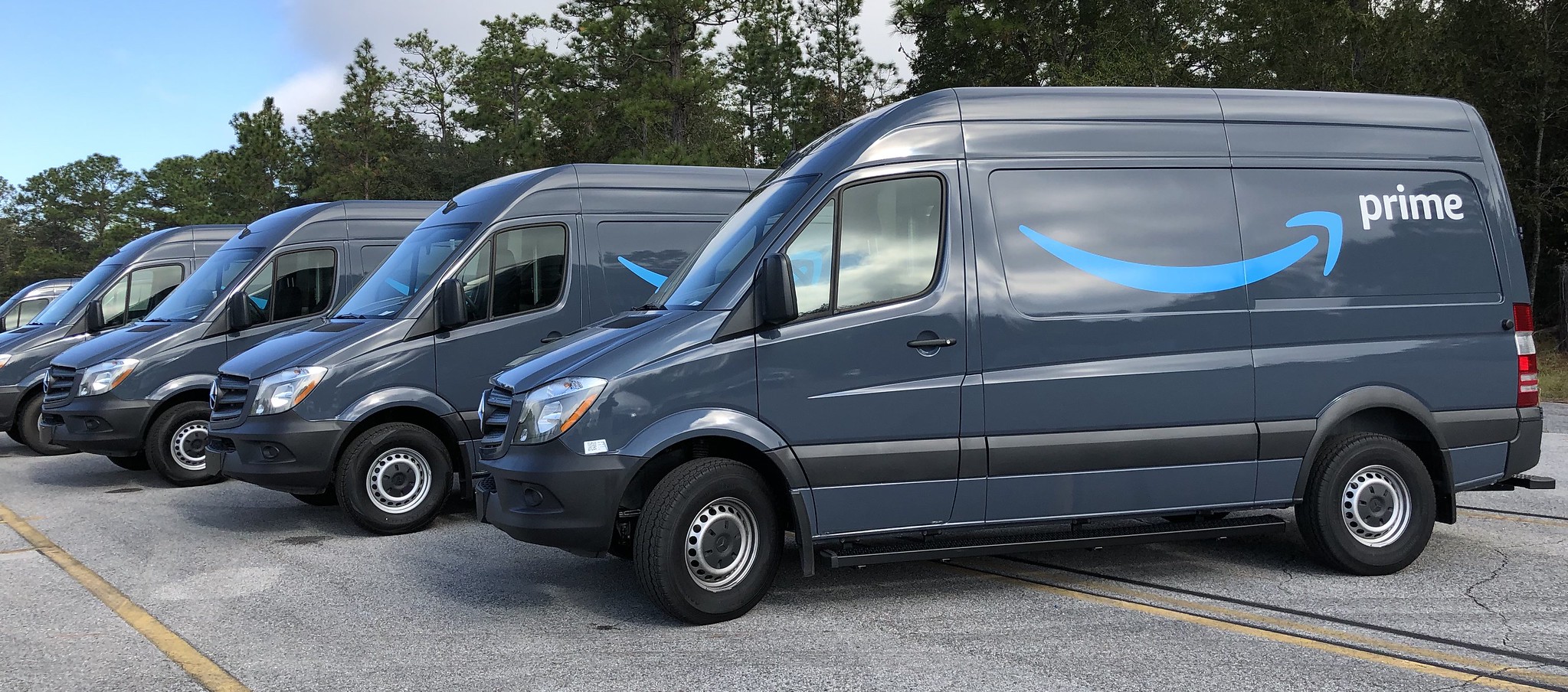What’s in the New ‘Climate’ Deal for Sustainable Transport — And What’s Not
9:18 AM EDT on July 29, 2022

Senator Joe Manchin. Photo: Third Way, CC
The Senate is on the brink of passing one of the most robust climate spending bills in U.S. history — but sustainable transportation advocates say it won't do enough to confront the nation's car dependency crisis or decarbonize the transportation sector.
Sen. Joe Manchin shocked the nation yesterday when he announced he'd support an ambitious new reconciliation package that would invest more than $433 into the Biden administration's core climate and healthcare agendas. That's because the largest beneficiaries of the newly-renamed "Inflation Reduction Act" were climate initiatives — many of which Manchin (D-W.V.) previously opposed.
A staggering 85 percent of spending in the bill ($369 billion) would be devoted to decarbonizing power plants, home HVAC systems and many other fuel-intense climate-change exascerbaters, in addition to a host of agricultural and forest restoration efforts, which climate analysts estimate could collectively reduce nationwide carbon emissions 40 percent below 2005 levels by 2030.
Sustainable transportation advocates praised the news, though many drew attention to what's absent from the bill: large-scale measures focused on decreasing Americans' reliance on automobiles.
I also am concerned—given overwhelmingly positive reaction among many Senators & environmentalists—that bill reflects a myopia with regard to the transport sector. We *must* think of green transport beyond just electric cars. There is so much more. End: https://t.co/2t6nKuwYLR
— Yonah Freemark (@yfreemark) July 28, 2022
These are the major transportation measures included in the bill, and how advocates are reacting so far.
Electric cars — lots and lots of 'em
As recently as April, Manchin was calling the very idea of a federal EV tax credit "ludicrous," citing already-long waitlists at dealerships amidst rising fuel costs and the inherent fallacy of "pay[ing] people to take" a product that automakers are already struggling to produce at a volume necessary to meet consumer demand.
The new reconciliation package, though, continues the existing $7,500 maximum federal credit for purchasing a battery-powered car. That's substantially less than the expanded maximum $12,500 credit that Biden sought under his plan, but the credit is still likely to be even more attractive than the current incentive, because the new bill also allows buyers, for the first time, to receive their discounts at the point of sale, rather than waiting until they file their taxes to get their money back. (Though, to be clear, it's still a tax credit, not a rebate, which means that only relatively wealthy people with high levels of tax liability will receive the biggest benefits.)
The Senate is also seeking to eliminate the 200,000 cap on vehicle purchases from a single automaker that are eligible for the credit, which means that buyers can once again choose vehicles from Tesla and GM, which exceeded their maximums long ago. Considering how Tesla, in particular, has flaunted safety regulators' concerns about its automated driving systems, that might not be great news to everyone.
The federal govt should just buy an e-bike for anyone who wants one… would be a lot cheaper and more effective than 1000’s of $ in subsidies for EVs
— Jack (@jacktymac) July 27, 2022
Some advocates did praise the the authors of the bill for introducing a maximum $4,000 credit for the purchase of used EVs, which could help address the problem of wealthy people buying new cars and not driving them enough to offset the additional carbon produced during their manufacture.
Less popular, though, was the administration's decision to deny that used EV credit to any single person making more than $75,000 (or married person making more than $150,000), while the income thresholds for new EV purchases are twice that.
Even worse, new electric pick-up truck, SUV and van purchases up to $80,000 are eligible for the credit, while only new cars costing less than $55,000 qualify, despite the fact that the former are far more likely to kill vulnerable road users on impact and take far longer to pay back the GHG debt they accrue during their initial production. Studies have shown that megacars are disproportionately likely to kill pedestrians, children, and Black Americans, and large electric cars, which are about 750 pounds heavier on average than their gas-powered counterparts, may be even deadlier.
"We're actually inducing people to buy heavier, more dangerous electric automobiles," said David Zipper, visiting fellow at the Harvard Kennedy School's Taubman Center for State and Local Government. "Four out of five vehicles sold today are already SUVs and trucks; if anything, I'd like to see the federal government nudge carmakers to shift the market back towards smaller vehicles like sedans ... What's most disappointing is how Congress is signaling that they're ready and willing to put money towards electrified SUVs and trucks and not towards other forms of mobility that are so much better for our communities in so many ways."
Meanwhile, electric transit and freight received no dedicated funds, despite experts' recommendations that those be the first things to go green.
No electric bike credits
One of the greenest, safest, and healthiest forms of mobility, of course, is the electric bicycle — which is why advocates were so disappointed to see that the first-ever federal e-bike credit has been completely scrapped from the Senate's new law, in contrast to Build Back Better, which offered buyers a 30 percent discount in the form of a tax credit, subject to income and price caps.
"I'm deeply disappointed that Senate democrats do not appreciate the fact that simply electrifying cars is not going to reach our climate goals of reducing temperature increase around the world," added Zipper. "We have to have mode shift, and the electric bike and cargo bike are incredible innovations that give us an unprecedented chance to do it in a cost-effective way, that also [helps tackle] what the federal government itself has called a national crisis in roadway safety deaths."
With the federal e-bike credit dead (at least for a while), it's time for states and cities to step up.
— David Zipper (@DavidZipper) July 28, 2022
Denver's wildly successful program (rebates up to $1,200) should serve as a model.https://t.co/eIksTjzhGm pic.twitter.com/SDry3GP6Ds
Ironically, experts suspect the e-bike credit was cut because it would be too popular among Americans, considering that they're already buying far more two-wheeled than four-wheeled EVs. (It seems that Manchin's concerns about long buyer waitlists did apply to bike shops, even as he reconsidered his stance when it came to dealerships.) Despite the fact that the average e-bike costs around $600-1,000, or less than 2 percent the cost of the average $54,000 e-car, analysts estimated an e-bike credit would cost the country $4.1 billion to meet demand.
"Politically, I understand why this credit was stripped, but it's unfortunate, to put it mildly," said Noa Banayan, director of Federal Affairs at People for Bikes. "We're not going to fix the safety epidemic on our roads or decarbonize the fleet anywhere near as fast as we could if we were replacing internal combustion engines with electric bicycles rather than electric cars. ... We don't want to stand in the way of any necessary climate policy, but it hurts to see bikes set to the side in favor of other electric vehicles, especially after the EBIKE Act gained such unprecedented support."
But Banayan did say there's still time for advocates to lobby their legislators to re-incorporate the credit — and for state and local municipalities to implement their own incentives, like Denver's overwhelmingly popular rebate.
"The fight isn't over, it's just over this round," she said. "We're going to keep fighting for this, and so will our champions in Congress."
New money to reconnect communities
An unexpected silver lining of the Inflation Reduction Act was the survival of the new $3.4-billion Neighborhood Equity and Access Grant program, which was first proposed under Build Back Better (at a slightly-higher price tag of $3.95 billion) to help reconnect communities torn apart by highways and other auto-centric roads.
If that sounds a whole lot like the $1 billion Reconnecting Communities Grant program in the Infrastructure Investment and Jobs Act, that's because experts say it was designed to boost a program that got slashed during negotiations last year. Neighborhood Access, though, is arguably even better than that earlier program, because it contains a $1.1 billion set-aside specifically for disadvantaged communities, and requires participants to make plans to protect existing residents from displacement.
"There's a bit more of a principle of, 'Let's repair this damage we've caused' behind this program," said Ben Crowther, advocacy manager for America Walks and one of the forces behind the Freeway Fighters Network. "This is certainly a victory, even if it's not the victory."
Can also be used to "build or improve complete streets,
— Sam Mintz (@samjmintz) July 28, 2022
multiuse trails, regional greenways, or active transportation networks and spines" or "to provide affordable access to essential destinations, public spaces, or transportation links and hubs"
Crowther cautioned that the new grant program isn't perfect, and that advocates will need to be vigilant to make sure the money is put to its highest and best use. For instance, the program prohibits participants from adding new lane miles specifically for the benefit of single occupancy vehicles, but would allow them to build new carpool lanes with the money if they slapped a pedestrian bridge on top of it.
"It's not airtight, and advocates are still going to need to push for transformative solutions like removing highways and replacing them with green space and city streets," added Crowther. "There's still a lot of nibbling around the edges in this bill, a lot of language about building sound barriers and other smaller projects that will improve quality of life, but don't actually deal with the elephant in the room."
Still, Crowther was heartened that the rest of the bill seemed to include no new money for highway building, even if things like high speed rail and dedicated new transit funding were stripped out, despite receiving around $10 billion each in the first draft of Build Back Better. With enough public outcry though, the Neighborhood Access and Equity Grants could be a big deal — but only if advocates stay vigilant and speak up.
"It's still gonna take that sort of pressure to turn this into a transformative bill rather than a band-aid," he said.
What's next?
Every sustainable transportation proponent we spoke to emphasized that advocates still have time to influence the bill's future, particularly if they're repped by lawmakers who are likely to force further negotiations, like Arizona Democrat Kyrsten Sinema.
"This is far from a done deal," Crowther said. "Advocates still need to show up and push for what they want — because until there is that groundswell of public pressure that's overwhelming and can't be ignored, this bill could continue to waver back and forth, just like Build Back Better did."
And even if this bill collapses, too, it's important to remember that the federal government isn't the only outfit that can impact the climate future — nor should it be the only one that tries.
"As frustrating as the structure of this reconciliation package is, it's important to keep eyes on the prize and remember that no amount of incentives for a bike is worth more than protected bike lane," added Zipper. "Creating safe places for people to walk and bike has historically been a state and local issue. This bill provides a modest tailwind for those efforts, and it underscores the need for cities and states to move even faster."
Kea Wilson is editor of Streetsblog USA. She has more than a dozen years experience as a writer telling emotional, urgent and actionable stories that motivate average Americans to get involved in making their cities better places. She is also a novelist, cyclist, and affordable housing advocate. She previously worked at Strong Towns, and currently lives in St. Louis, MO. Kea can be reached at kea@streetsblog.org or on Twitter @streetsblogkea. Please reach out to her with tips and submissions.
Read More:
Stay in touch
Sign up for our free newsletter
More from Streetsblog USA
You Wouldn’t Like Monday’s Headlines When They’re Angry
Which state has the worst road rage? Consumer Affairs magazine looked at a variety of factors to come up with an answer.
When it Comes to Federal Infrastructure Grants, Size Does Matter
Cities and municipalities with larger budgets and staff are more likely to win competitive federal infrastructure grants, the Urban Institute has found.
The E-Commerce Explosion is Making Roads More Dangerous
And can advanced technology stop the bloodshed?
Are Friday’s Headlines the New Normal?
Transit ridership hasn't come all the way back from the pandemic, and they're going to need more federal help, along with other changes, says Governing magazine.
Friday Video: How to Make Places Safe For Non-Drivers After Dark
A top Paris pedestrian planner, a leading GIS professional, and Streetsblog's own Kea Wilson weigh in on the roots of America's nighttime road safety crisis, and the strategies that can help end it.




